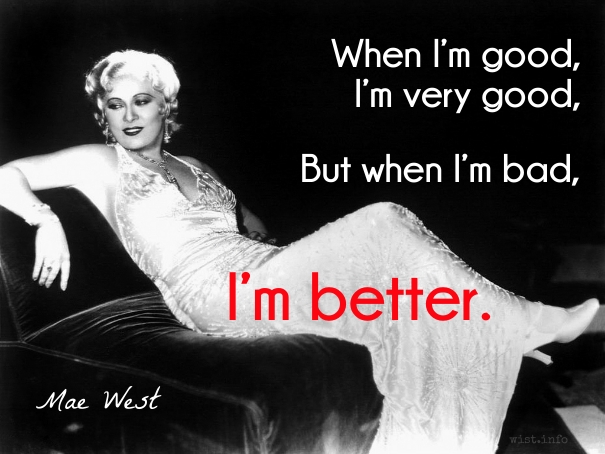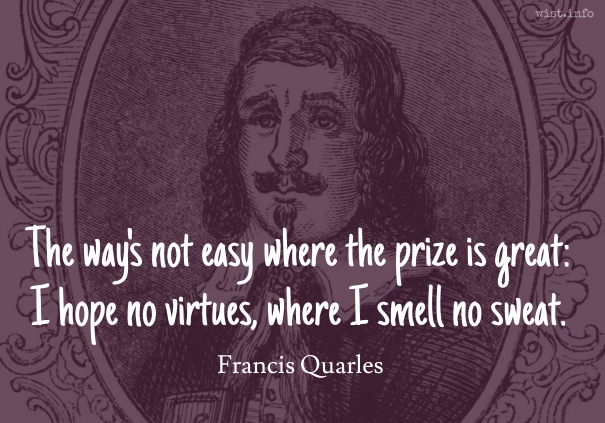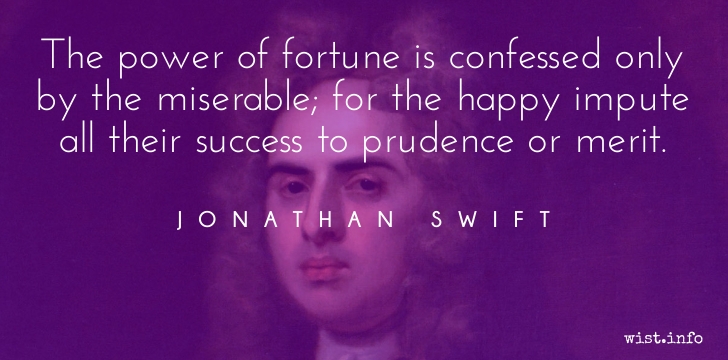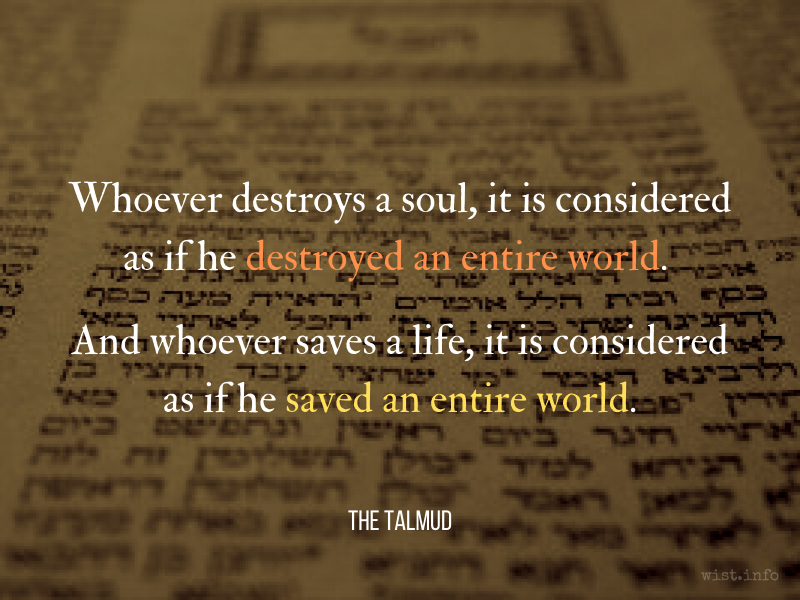This is a vice in them, that were a vertue in us; for obstinacy in a bad cause, is but constancy in a good.
Thomas Browne (1605-1682) English physician and author
Religio Medici, Part 1, sec. 25 (1643)
(Source)
Quotations about:
virtue
Note not all quotations have been tagged, so Search may find additional quotes on this topic.
One of the temptations of upper-middle class life is to create sharp edges of our moral sensitivities that allows comfortable confusions about sin and virtue. The difference between rich and poor is not that the rich sin more than the poor, it is that the rich find it easier to call sin a virtue. When the poor sin, they call it sin; when they see holiness, they identify it as such. This intuitive clarity is often absent from the wealthy, and that absence easily leads to the atrophy of the moral sense.
When I’m good, I’m very good, but when I’m bad, I’m better.
LADY MACBETH: Whither should I fly?
I have done no harm. But I remember now
I am in this earthly world; where to do harm
Is often laudable, to do good sometime
Accounted dangerous folly.William Shakespeare (1564-1616) English dramatist and poet
Macbeth, Act 4, sc. 2, l. 81ff (4.2.81-85) (1606)
(Source)
The voice of conscience is so delicate that it is easy to stifle it; but it is also so clear that it is impossible to mistake it.
Germaine de Staël (1766-1817) Swiss-French writer, woman of letters, critic, salonist [Anne Louise Germaine de Staël-Holstein, Madame de Staël, Madame Necker]
Germany [De l’Allemagne], Part 3, ch. 13 (1813)
(Source)
The way’s not easy where the prize is great:
I hope no virtues, where I smell no sweat.Francis Quarles (1592-1644) English poet
Emblems, Emblem 11, Epigram (1634)
(Source)
Often given, "I see no virtue where I smell no sweat."
I think all Christians would agree with me if I said that though Christianity seems at first to be all about morality, all about duties and rules and guilt and virtue, yet it leads you on, out of all that, into something beyond.
C. S. Lewis (1898-1963) English writer, literary scholar, lay theologian [Clive Staples Lewis]
Mere Christianity, “Faith” (1952)
(Source)
The real trouble is that “kindness” is a quality fatally easy to attribute to ourselves on quite inadequate grounds. Everyone feels benevolent if nothing happens to be annoying him at the moment. Thus a man easily comes to console himself for all his other vices by a conviction that “his heart’s in the right place” and “he wouldn’t hurt a fly,” though in fact he has never made the slightest sacrifice for a fellow creature. We think we are kind when we are only happy: it is not so easy, on the same grounds, to imagine oneself temperate, chaste, or humble. You cannot be kind unless you have all the other virtues. If, being cowardly, conceited and slothful, you have never yet done a fellow creature great mischief, that is only because your neighbour’s welfare has not yet happened to conflict with your safety, self-approval, or ease. Every vice leads to cruelty.
It’s no great Commendation to just forbear doing Ill: thou art bound moreover to do Good to others; if thou dost not, thou art not Good to thy self.
Thomas Fuller (1654-1734) English physician, preacher, aphorist, writer
Introductio ad Prudentiam, # 716 (1725)
(Source)
Although men are accused of not knowing their own weakness, yet perhaps as few know their own strength. It is in men as in soils, where sometimes there is a vein of gold, which the owner knows not of.
Jonathan Swift (1667-1745) English writer and churchman
“Thoughts on Various Subjects” (1706)
(Source)
The power of fortune is confessed only by the miserable; for the happy impute all their success to prudence or merit.
Jonathan Swift (1667-1745) English writer and churchman
“Thoughts on Various Subjects” (1706)
(Source)
Whoever destroys a soul, it is considered as if he destroyed an entire world. And whoever saves a life, it is considered as if he saved an entire world.
The Talmud (AD 200-500) Collection of Jewish rabbinical writings
Mishnah Sanhedrin 4:9; Yerushalmi Talmud, Tractate Sanhedrin 37a
(Source)
Alt. trans.: "Whoever destroys a single life is as guilty as though he had destroyed the entire world; and whoever rescues a single life earns as much merit as though he had rescued the entire world."
What I particularly admire in him is the firm stand he has taken, not only against the oppressors of his countrymen, but also against those opportunists who are always ready to compromise with the Devil. He perceives very clearly that the world is in greater peril from those who tolerate or encourage evil than from those who actually commit it.
[Was ich aber an ihm besonders bewundere ist seine charaktervolle Haltung nicht nur gegen die Unterdrücker seines Volkes, sondern auch gegen alle diejenigen Opportunisten, die immer bereit sind, mit dem Teufel zu paktieren. Er hat klar erkannt, dass die Welt mehr bedroht ist durch die, welche das Uebel dulden oder ihm Vorschub leisten, als durch die Uebeltäter selbst.]
Albert Einstein (1879-1955) German-American physicist
In Josep Maria Corredor, Conversations avec Pablo Casals [Conversations with Casals], Preface (1955) [tr. Mangeot (1956)]
(Source)
The last part of the last sentence here is most frequently quoted. The text is from a letter Einstein wrote to Corredor about Pablo Casals, the Spanish cellist (30 Mar 1953), of which part was included in the Preface. The book of interviews with Casals was originally published in French, and used this translation to that language:
Ce que j’admire cependant particulièrement en lui, c’est sa ferme attitude non seulement à l’endroit des oppresseurs de son peuple, mais également à l’endroit des opportunistes toujours prêts à pactiser avec le diable. Il a su comprendre avec beaucoup de clairvoyance que le monde court un plus grand danger de la part de ceux qui tolèrent le mal ou l’encouragent que de la part de ceux-là mêmes qui le commettent.
Variants / paraphrases:More discussion and background of this quotation:
- "The world is a dangerous place, not because of those who do evil, but because of those who look on and do nothing."
- "The world is too dangerous to live in, not because of people’s evil deeds but because of those who sit and let it happen."
- "The world is a dangerous place not because there are so many evil people in it, but because there are so many good ones willing to sit back and let evil happen."
- "The world is not dangerous because of those who do harm. It’s dangerous because of those who watch and do nothing."
- "The world will not be destroyed by those who do evil, but by those who watch them without doing anything."
- The World Is in Greater Peril from Those Who Tolerate or Encourage Evil Than from Those Who Actually Commit It – Quote Investigator.
- ZITATFORSCHUNG: "Die Welt wird nicht bedroht von den Menschen, die böse sind, sondern von denen, die das Böse zulassen." Albert Einstein (angeblich).
- Juttas Zitateblog: Die Welt wird nicht bedroht von den Menschen, die böse sind, sondern von denen, die das Böse zulassen.
Step by step they were led to things which dispose to vice: the lounge, the bath, the elegant banquet. All this in their ignorance they called civilisation, when it was but a part of their servitude.
[Idque apud imperitos humanitas vocabatur, cum pars servitutis esset.]
Our public morality, then — the moral standards we maintain for everyone, not just the ones we insist on in our private lives — depends on a consensus view of right and wrong. The values derived from religious belief will not — and should not — be accepted as part of the public morality unless they are shared by the pluralistic community at large, by consensus. That values happen to be religious values does not deny them acceptability as a part of this consensus. But it does not require their acceptability, either.
Mario Cuomo (1932-2015) American politician
“Religious Belief and Public Morality,” John A. O’Brien Lecture, U. of Notre Dame (13 Sep 1984)
(Source)
Anything I like is either illegal or immoral or fattening.
Alexander Woollcott (1887-1943) American critic, commentator, journalist, wit
(Attributed)
Apparently a gag attributed by Woollcott to a Frank Rand of St. Louis on his radio show in September 1933; it was then directly attributed to Woollcott in Reader's Digest in Dec. 1933. It is sometimes cited to Woollcott's essay "The Knock at the Stage Door," The North American Review (Sep 1922), but not found there.
Variants:More discussion about this quotation:
- "All the things I like to do are either immoral, illegal, or fattening."
- "All the things I really like to do are either immoral, illegal or fattening."
- "Everything I want to do is either illegal, immoral or fattening."
Public virtue cannot exist in a nation without private, and public virtue is the only foundation of republics. There must be a positive passion for the public good, the public interest, honour, power and glory, established in the minds of the people, or there can be no republican government, nor any real liberty: and this public passion must be superior to all private passions.
Virtue and learning, like gold, have their intrinsic value: but if they are not polished, they certainly lose a great deal of their lustre; and even polished brass will pass upon more people than rough gold.
Lord Chesterfield (1694-1773) English statesman, wit [Philip Dormer Stanhope]
Letter to his son, #118 (6 Mar 1747)
(Source)
The Day of the Lord will come like a thief, and then with a roar the sky will vanish, the elements will catch fire and fall apart, the earth and all that it contains will be burnt up. Since everything is coming to an end like this, you should be living holy and saintly lives while you wait and long for the Day of God to come, when the sky will dissolve in flames and the elements melt in the heat.
The Bible (The New Testament) (AD 1st - 2nd C) Christian sacred scripture
2 Peter 3:10-12 [JB (1966)]
(Source)
Alternate translations:
But the day of the Lord will come as a thief in the night; in the which the heavens shall pass away with a great noise, and the elements shall melt with fervent heat, the earth also and the works that are therein shall be burned up. Seeing then that all these things shall be dissolved, what manner of persons ought ye to be in all holy conversation and godliness, looking for and hasting unto the coming of the day of God, wherein the heavens being on fire shall be dissolved, and the elements shall melt with fervent heat?
[KJV (1611)]
But the Day of the Lord will come like a thief. On that Day the heavens will disappear with a shrill noise, the heavenly bodies will burn up and be destroyed, and the earth with everything in it will vanish. Since all these things will be destroyed in this way, what kind of people should you be? Your lives should be holy and dedicated to God, as you wait for the Day of God and do your best to make it come soon -- the Day when the heavens will burn up and be destroyed, and the heavenly bodies will be melted by the heat.
[GNT (1976)]
But the day of the Lord will come like a thief, and then the heavens will pass away with a loud noise, and the elements will be destroyed with fire, and the earth and everything that is done on it will be disclosed. Since all these things are to be destroyed in this way, what sort of persons ought you to be in leading lives of holiness and godliness, waiting for and hastening the coming of the day of God, because of which the heavens will be set ablaze and destroyed and the elements will melt with fire?
[NRSV (1989 ed.)]
But the day of the Lord will come like a thief. The heavens will disappear with a roar; the elements will be destroyed by fire, and the earth and everything done in it will be laid bare. Since everything will be destroyed in this way, what kind of people ought you to be? You ought to live holy and godly lives as you look forward to the day of God and speed its coming. That day will bring about the destruction of the heavens by fire, and the elements will melt in the heat.
[NIV (2011 ed.)]
There is such a thing as internal collapse. Despairing certitude does not infiltrate a human being without displacing and disrupting certain profound elements that sometimes constitute the man himself. Grief, when it reaches this pitch, routs all strength of conscience. These are deadly crises. Few of us emerge from them true to ourselves and steadfast in our duty. When the limit of endurance is exceeded, the most unshakeable virtue is undermined.
[Il y a des effondrements intérieurs. La pénétration d’une certitude désespérante dans l’homme ne se fait point sans écarter et rompre de certains éléments profonds qui sont quelquefois l’homme lui-même. La douleur, quand elle arrive à ce degré, est un sauve-qui-peut de toutes les forces de la conscience. Ce sont là des crises fatales. Peu d’entre nous en sortent semblables à eux-mêmes et fermes dans le devoir. Quand la limite de la souffrance est débordée, la vertu la plus imperturbable se déconcerte.]
Victor Hugo (1802-1885) French writer
Les Misérables, Part 4 “Saint Denis,” Book 15 “The Rue de L’Homme Armé,” ch. 1 (4.15.1) (1862) [tr. Donougher (2013)]
(Source)
Valjean "internally collapsing" at the realization that Cosette plans to leave him for Marius, and deciding to track Marius down to confront or even kill him.
(Source (French)). Alternate translations:
There are interior subsoilings. The penetration of a torturing certainty into man does not occur without breaking up and pulverising certain deep elements which are sometimes the man himself. Grief, when it reaches this stage, is a panic of all the forces of the soul. These are fatal crises. Few among us come through them without change, and firm in duty. When the limit of suffering is overpassed, the most imperturbable virtue is disconcerted.
[tr. Wilbour (1862)]
There are such things as internal landslides; the penetration of a desperate certainty into a man is not effected without removing and breaking certain profound elements which are at times the man himself. Grief, when it attains that pitch, is a frantic flight of all the forces of the conscience, and such crises are fatal Few among us emerge from them equal to ourselves and firm in our duty, for when the limit of suffering is exceeded the most imperturbable virtue is disconcerted.
[tr. Wraxall (1862)]
There is such a thing as the sudden giving way of the inward subsoil. A despairing certainty does not make its way into a man without thrusting aside and breaking certain profound elements which, in some cases, are the very man himself. Grief, when it attains this shape, is a headlong flight of all the forces of the conscience. These are fatal crises. Few among us emerge from them still like ourselves and firm in duty. When the limit of endurance is overstepped, the most imperturbable virtue is disconcerted.
[tr. Hapgood (1887)]
There is such a thing as spiritual collapse. The thrust of a desperate certainty into a man cannot occur without the disruption of certain profound elements which are sometimes the man himself. Anguish, when it has reached this stage, becomes a panic-flight of all the powers of conscience. There are mortal crises from which few of us emerge in our right mind, with our sense of duty still intact. When the limit of suffering is overpassed the most impregnable virtue is plunged in disarray.
[tr. Denny (1976)]
There are interior collapses. The penetration of a torturing certainty within man does not occur without breaking up and pulverizing certain deep elements that are sometimes the man himself. Grief, when it reaches this level, is a panic of all the forces of consciousness. These are fatal crises. Few among us come through them unchanged and firm in duty. When the limit of suffering is topped, the most imperturbable virtue is disconcerted.
[tr. Wilbour/Fahnestock/MacAfee (1987)]
The aim of every political constitution is, or ought to be, first to obtain for rulers men who possess most wisdom to discern, and most virtue to pursue, the common good of the society; and in the next place, to take the most effectual precautions for keeping them virtuous whilst they continue to hold their public trust.
We may have an excellent Ear in Musick, without being able to perform in any kind. We may judge well of Poetry, without being Poets, or possessing the least of a Poetick Vein: But we can have no tolerable Notion of Goodness, without being tolerably good.
The evil that is in the world always comes of ignorance, and good intentions may do as much harm as malevolence, if they lack understanding. On the whole men are more good than bad; that, however, isn’t the real point. But they are more or less ignorant, and it is this that we call vice or virtue; the most incorrigible vice being that of an ignorance which fancies it knows everything and therefore claims for itself the right to kill. There can be no true goodness, nor true love, without the utmost clear-sightedness.
Power always Sincerely, conscientiously, de très bon foi, believes itself Right. Power always thinks it has a great Soul and vast Views, beyond the Comprehension of the Weak; and that it is doing God Service when it is violating all his Laws.
John Adams (1735-1826) American lawyer, Founding Father, statesman, US President (1797-1801)
Letter to Thomas Jefferson (2 Feb 1816)
(Source)
de très bon foi = "very candidly"
There is an affected humility more unsufferable than downright pride, as hypocrisy is more abominable than libertinism. Take care that your virtues be genuine and unsophisticated.
James Burgh (1714-1775) British politician and writer
The Dignity of Human Nature, Sec. 5 “Miscellaneous Thoughts on Prudence in Conversation” (1754)
(Source)
Honest statesmanship is the wise employment of individual meannesses for the public good.
Abraham Lincoln (1809-1865) American lawyer, politician, US President (1861-65)
(Attributed)
(Source)
Attributed in John G. Nicolay and John Hay, Abraham Lincoln: A History, vol. 10, ch. 18 "Lincoln's Fame" (1886).
At a dinner given by Periander, tyrant of Corinth, to the Seven Wise Men, including Anacharsis, the question was asked, What is the ideal state, or most perfect form of popular government? The answers given by the philosophers were as follows:—
Solon: “That in which an injury done to the least of its citizens is an injury done to all.”
Bias: “Where the law has no superior.”
Thales: “Where the rich are neither too rich, nor the poor too poor.”
Anacharsis: “Where virtue is honored, and vice detested.”
Pittacus: “Where dignities are always conferred on the good, never on the bad.”
Cleobulus: “Where the citizens fear blame more than punishment.”
Chilo: “Where the laws are more regarded, and have more authority, than the orators.”
Goethe has asked, “What government is best? That which teaches us to govern ourselves.” At another time he said, “The best government is that which makes itself superfluous.”
“Good government,” says Confucius, “obtains when those who are near are made happy, and those who are far off are attracted.”
The truth is, as every one knows, that the great artists of the world are never Puritans, and seldom even ordinarily respectable. No virtuous man — that is, virtuous in the Y.M.C.A. sense — has ever painted a picture worth looking at, or written a symphony worth hearing, or a book worth reading.
I have never seen anyone who loves virtue as much as he loves beautiful women.
[吾未見好德、如好色者也。]
Confucius (c. 551- c. 479 BC) Chinese philosopher, sage, politician [孔夫子 (Kǒng Fūzǐ, K'ung Fu-tzu, K'ung Fu Tse), 孔子 (Kǒngzǐ, Chungni), 孔丘 (Kǒng Qiū, K'ung Ch'iu)]
The Analects [論語, 论语, Lúnyǔ], Book 9, verse 18 (9.18) and Book 15, verse 13 (15.13) (6th C. BC – AD 3rd C.) [tr. Huang (1997)]
(Source)
The two analects are the same in Chinese, although the second is prefaced by an expression of despair or exasperation (e.g., "It's hopeless!" or "I should just give up!"). In both instances, it is attributed by Sima Qian to Confucius' irritation while riding behind Duke Ling of Wei and his beautiful wife, Nan Tzu.
Legge and other early translators number these as 9.17 and 15.12, as shown below.
(Source: 9.18, 15.13, Chinese). Alternate translations:
I have not seen one who loves virtue as he loves beauty.
[tr. Legge (1861), 9.17, 15.12]
I have not yet met with the man who loves Virtue as he loves Beauty
[tr. Jennings (1895), 9.17, 15.12]
I do not now see a man who can love moral worth in man as he loves beauty in woman. (9.17)
I do not now see a man who loves moral worth as he loves beauty in women. (15.12)
[tr. Ku Hung-Ming (1898)]
I have never yet seen a man whose love of virtue equaled his love of woman. (9.17)
I have never yet seen as man as fond of virtue as of beauty. (15.12)
[tr. Soothill (1910)]
I do not see love of looking into the mind and acting on what one sees there to match love of someone having beauty. (9.17)
I have not seen anyone who loves acting from inwit as they love a beautiful person. (15.12)
[tr. Pound (1933)]
I have never seen anyone whose desire to build up his moral power was as strong as sexual desire. (9.17)
In vain have I looked for one whose desire to build up his moral power was as strong as sexual desire. (15.12)
[tr. Waley (1938)]
I have never yet seen people attracted by virtuous scholars as they are by beautiful women. (Reference)
I haven't yet seen people who love virtue as they love beauty. (Reference)
[tr. Lin Yutang (1938)]
I have yet to meet a man as fond of high moral conduct as he is of outward appearances.
[tr. Ware (1950), 9.18, 15.13]
I have yet to meet the man who is as fond of virtue as he is of beauty in women.
[tr. Lau (1979), 9.18, 15.13]
I have never come across anyone who admires virtue as much as he admires sexual attraction.
[tr. Dawson (1993), 9.18, 15.13]
I have never seen anyone who loved virtue as much as sex. (9.18)
I have never seen a man who loved virtue as much as sex. (15.13)
[tr. Leys (1997)]
I have not seen one person who likes the virtuousness as likes the beauteousness. (9.18)
I cannot see the person who likes the virtuousness as likes the beauteousness. (15.13)
[tr. Cai/Yu (1998)]
I have yet to meet the person who is fonder of excellence (de) than of physical beauty.
[tr. Ames/Rosemont (1998), 9.18, 15.13]
I have never seen anyone who loves virtue the way he loves beauty.
[tr. Brooks/Brooks (1998), 9.18, 15.13]
I've never seen anyone for whom loving Integrity is like loving a beautiful woman.
[tr. Hinton (1998), 9.18, 15.13]
I have yet to meet a man who loves Virtue as much as he loves female beauty.
[tr. Slingerland (2003), 9.18, 15.13]
I have never seen the person who loved virtue the way he loved physical beauty.
[tr. Watson (2007), 9.18, 15.13]
I have never met a person who loved virtue as much as he loved physical beauty.
[tr. Chin (2014), 9.18]
I have never seen anyone who loves virtues as much as sexy women.
[tr. Li (2020), 9.18, 15.13]
For the renown which riches or beauty confer is fleeting and frail; mental excellence is a splendid and lasting possession.
[Nam divitiarum et formae gloria fluxa atque fragilis est, virtus clara aeternaque habetur.]
Sallust (c. 86-35 BC) Roman historian and politician [Gaius Sallustius Crispus]
Bellum Catilinae [The War of Catiline; The Conspiracy of Catiline], ch. 1, sent. 4 [tr. Rolfe (1931)]
(Source)
Original Latin. Alt. trans.:
- "For what are all the advantages of wealth, and all the graces of form and feature? mere precarious gifts, that soon fade and moulder away. It is virtue, and virtue only, that ennobles the human character, and lives in the memory of the after-times." [tr. Murphy (1807)]
- "For the splendour derived from riches and beauty is short-lived and frail, virtue alone confers immortality." [tr. Rose (1831)
- "For the glory of riches and beauty is fickle and frail; virtue is accounted bright and everlasting." [Source (1841)]
- "For the glory of wealth and beauty is fleeting and perishable; that of intellectual power is illustrious and immortal." [tr. Watson (1867)]
- "The glory of wealth and beauty is fleeting and frail, but personal merit is held in eternal honour." [tr. Pollard (1882)]
- "The glory of riches and appearance is fleeting and fragile, but to have prowess is something distinguished and everlasting. [tr. Woodman (2007)]
- "For the fame of riches and beauty is fickle and frail, while virtue is eternally excellent."
Every man takes care that his neighbor shall not cheat him. But a day comes when he begins to care that he do not cheat his neighbor. Then all goes well. He has changed his market cart for a chariot of the sun.
Ralph Waldo Emerson (1803-1882) American essayist, lecturer, poet
“Worship,” The Conduct of Life, ch. 6 (1860)
(Source)
If we did a good act merely from the love of god, and a belief that it is pleasing to him, whence arises the morality of the Atheist? It is idle to say as some do, that no such being exists. We have the same evidence of the fact as of most of those we act on, to wit, their own affirmations, and their reasonings in support of them. I have observed indeed generally that, while in protestant countries the defections from the Platonic Christianity of the priests is to Deism, in Catholic countries they are to Atheism. Diderot, Dalembert, D’Holbach Condorcet, are known to have been among the most virtuous of men. Their virtue then must have had some other foundation than the love of god.
Thomas Jefferson (1743-1826) American political philosopher, polymath, statesman, US President (1801-09)
Letter to Thomas Law (13 Jun 1814)
(Source)
In fact we say that an intention is good, that is, right in itself, but that an action does not bear any good in itself but proceeds from a good intention. Whence when the same thing is done by the same man at different times, by the diversity of his intention, however, his action is now said to be good, now bad.
Bonam quippe intentionem, hoc est, rectam in se dicimus, operationem vero non quod boni aliquid in se suscipiat, sed quod ex bona intentione procedat. Unde et ab eodem homine cum in diversis temporibus idem fiat, pro diversitate tamen intentione eius operatio modo bono modo mala dicitur.
Courage is a quality so necessary for maintaining virtue that it is always respected, even when it is associated with vice.
Samuel Johnson (1709-1784) English writer, lexicographer, critic
Comment (11 Jun 1784)
(Source)
In James Boswell, The Life of Samuel Johnson (1791)
Therefore virtue also depends on ourselves. And so also does vice. For where we are free to act we are also free to refrain from acting, and where we are able to say No we are also able to say Yes; if therefore we are responsible for doing a thing when to do it is right, we are also responsible for not doing it when not to do it is wrong, and if we are responsible for rightly not doing a thing, we are also responsible for wrongly doing it. But if it is in our power to do and to refrain from doing right and wrong, and if, as we saw, being good or bad is doing right or wrong, it consequently depends on us whether we are virtuous or vicious.
Aristotle (384-322 BC) Greek philosopher
Nicomachean Ethics [Ἠθικὰ Νικομάχεια], Book 3, ch. 5 (3.5) / 1113b (c. 325 BC) [tr. Rackham (1934)]
(Source)
Source of the common summary, "What lies in our power to do, it lies in our power not to do." Alternate translations:
Virtue is in our power. And so too is Vice: because wherever it is in our power to do it is also in our power to forbear doing, and vice versâ: therefore if the doing (being in a given case creditable) is in our power, so too is the forbearing (which is in the same case discreditable), and vice versâ. But if it is in our power to do and to forbear doing what is creditable or the contrary, and these respectively constitute the being good or bad, then the being good or vicious characters is in our power.
[tr. Chase (1847), ch. 7]
Virtue is in our own power, and, by parity of reasoning, so is vice. For where it is in our power to do a thing, it is equally in our power to abstain from doing it; where refusal is in our power, assent is equally so. So that, if to do such or such a thing, which is noble, be in our power, to abstain from it, which is disgraceful, will be equally in our power; and ift0o abstain from doing such or such a thing, which is noble, be in our power, then to do it, which is disgraceful, will be equally in our power. And if, in a word, it be in our power to do what is noble and what is disgraceful, it is equally in our power not to do it. Or in other words, it is in our power to be good men or bad. It rests, then, with ourselves whether we are to be virtuous or vicious.
[tr. Williams (1869)]
Virtue and vice are both alike in our own power; for where it is in our power to act, it is also in our power to refrain from acting, and where it is our power to refrain from acting, it is also in our power to act. Hence if it is in our power to act when action is noble, it will also be in our power to refrain from acting when inaction is shameful, and if it is our power to refrain from acting when inaction is noble, it will also be in our power to act when action is shameful. But if it is in our power to do, and likewise not to do, what is noble and shameful, and if so to act or not to act is as we have seen to be good or bad, it follows that it is in our power to be virtuous or vicious.
[tr. Welldon (1892), ch. 7]
Therefore virtue depends upon ourselves: and vice likewise. For where it lies with us to do, it lies with us not to do. Where we can say no, we can say yes. If then the doing a deed, which is noble, lies with us, the not doing it, which is disgraceful, lies with us; and if the not doing, which is noble, lies with us, the doing, which is disgraceful, also lies with us. But if the doing and likewise the not doing of noble or base deeds lies with us, and if this is, as we found, identical with being good or bad, then it follows that it lies with us to be worthy or worthless men.
[tr. Peters (1893)]
Therefore virtue also is in our own power, and so too vice. For where it is in our power to act it is also in our power not to act, and vice versa; so that, if to act, where this is noble, is in our power, not to act, which will be base, will also be in our power, and if not to act, where this is noble, is in our power, to act, which will be base, will also be in our power. Now if it is in our power to do noble or base acts, and likewise in our power not to do them, and this was what being good or bad meant, then it is in our power to be virtuous or vicious.
[tr. Ross (1908)]
Virtue too is up to us, then, and similarly, vice. For where acting is up to us, so is not acting, and where saying "No" is up to us, so is saying "Yes." Hence if acting, when it is noble, is up to us, not acting, when it is shameful, will also be up to us. And if not acting, when it is noble, is up to us, acting, when it is shameful, will also be up to us. But if doing noble actions or doing shameful ones is up to us, and similarly, also not doing them (which is what being good people and being bad people consisted in), then being decent or base will be up to us.
[tr. Reeve (1948)]
So virtue, too, is in our power, and also vice for a similar reason. For where it is in our power to act, it is also in our power not to act, and where it is in our power not to act, it is also in our power to act; so if to act, when it is noble, is in our power, then also not to act, which would then be disgraceful, would be in our power, and if not to act, when it is noble, is in our power, then also to act, which would then be disgraceful, would be in our power. If it is in our power, then, to do what is noble or disgraceful, and likewise not to do what is noble or disgraceful, and to act or not to act nobly or disgracefully, as stated earlier, is to be good or bad, then it is our power to be good or bad men.
[tr. Apostle (1975)]
Therefore virtue lies in our power, and similarly so does vice; because where it is in our power to act, it is also in our power not to act, and where we can refuse we can also also comply. So if is in our power to do a thing when it is right, it will also be in our power not to do it when it is wrong; and if it is in our power not to do it when it is right, it will also be in our power to do it when it is wrong. And if it is in our power to do right and wrong, and similarly not to do them; and if, as we saw, doing right or wrong is the essence of being good or bad, it follows that it is in our power to be decent or worthless.
[tr. Thomson/Tredennick (1976)]
Virtue, then, is in our power, and so is vice. Where it is in our power to act, it is also in our power not to act, and where saying "No" is in our power, so is saying "Yes" so that if it is in our power to act when it would be noble, it will also be in our power not to act when it would be shameful, and if it is in our power not to act when it would be noble, it will also be in our power to act when it would be shameful. Now if it is in our power to do noble and shameful actions, and the same goes for not doing them, and if, as we saw, being good and bad consists in this, then it is in our power to be good or bad.
[tr. Crisp (2000)]
God give us men. The time demands
Strong minds, great hearts, true faith, and willing hands;
Men whom the lust of office does not kill;
Men whom the spoils of office cannot buy;
Men who possess opinions and a will;
Men who have honor; men who will not lie;
Men who can stand before a demagogue
And damn his treacherous flatteries without winking;
Tall men, sun-crowned, who live above the fog
In public duty and in private thinking ….J. G. Holland (1819-1881) American novelist, poet, editor [Josiah Gilbert Holland; pseud. Timothy Titcomb]
“Wanted” (1872)
(Source)
Adapted by Martin Luther King in 1956: "God give us leaders. A time like this demands great leaders. Leaders whom the fog of life cannot chill, men whom the lust of office cannot buy. Leaders who have honor, leaders who will not lie. Leaders who will stand before a pagan god and damn his treacherous flattery."
I’m as pure as the driven slush.
Tallulah Bankhead (1902-1968) American actress
In the Observer (24 Feb 1957)
The first step toward greatness is to be honest, says the proverb; but the proverb fails to state the case strong enough. Honesty is not only “the first step toward greatness,” — it is greatness itself.
Christian Nestell Bovee (1820-1904) American epigrammatist, writer, publisher
Intuitions and Summaries of Thought, vol. 1 (1862)
(Source)
There is one thing that Christ and all the Christian saints have said with a sort of savage monotony. They have said simply that to be rich is to be in peculiar danger of moral wreck. It is not demonstrably un-Christian to kill the rich as violators of definable justice. It is not demonstrably un-Christian to crown the rich as convenient rulers of society. It is not certainly un-Christian to rebel against the rich or to submit to the rich. But it is quite certainly un-Christian to trust the rich, to regard the rich as more morally safe than the poor.
My principle is to do whatever is right, and leave consequences to him who has the disposal of them.
Thomas Jefferson (1743-1826) American political philosopher, polymath, statesman, US President (1801-09)
Letter to George Logan (3 Oct 1813)
(Source)
The highest panegyric, therefore, that private virtue can receive, is the praise of servants.
Samuel Johnson (1709-1784) English writer, lexicographer, critic
The Rambler, #68 (10 Nov 1750)
(Source)
The virtues of society are the vices of the saint. The terror of reform is the discovery that we must cast away our virtues, or what we have always esteemed such, into the same pit that has consumed our grosser vices.
Ralph Waldo Emerson (1803-1882) American essayist, lecturer, poet
“Circles,” Essays: First Series (1841)
(Source)





















































